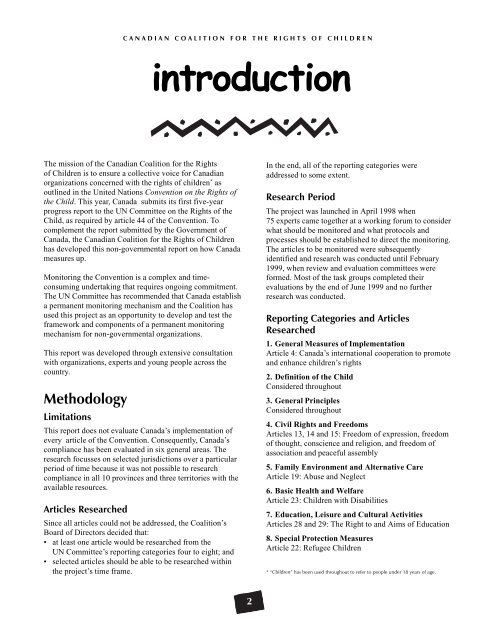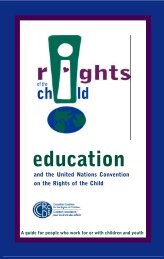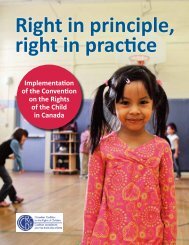Poste - Canadian Coalition for the Rights of Children
Poste - Canadian Coalition for the Rights of Children
Poste - Canadian Coalition for the Rights of Children
You also want an ePaper? Increase the reach of your titles
YUMPU automatically turns print PDFs into web optimized ePapers that Google loves.
C A N A D I A N C O A L I T I O N F O R T H E R I G H T S O F C H I L D R E N<br />
The mission <strong>of</strong> <strong>the</strong> <strong>Canadian</strong> <strong>Coalition</strong> <strong>for</strong> <strong>the</strong> <strong>Rights</strong><br />
<strong>of</strong> <strong>Children</strong> is to ensure a collective voice <strong>for</strong> <strong>Canadian</strong><br />
organizations concerned with <strong>the</strong> rights <strong>of</strong> children * as<br />
outlined in <strong>the</strong> United Nations Convention on <strong>the</strong> <strong>Rights</strong> <strong>of</strong><br />
<strong>the</strong> Child. This year, Canada submits its first five-year<br />
progress report to <strong>the</strong> UN Committee on <strong>the</strong> <strong>Rights</strong> <strong>of</strong> <strong>the</strong><br />
Child, as required by article 44 <strong>of</strong> <strong>the</strong> Convention. To<br />
complement <strong>the</strong> report submitted by <strong>the</strong> Government <strong>of</strong><br />
Canada, <strong>the</strong> <strong>Canadian</strong> <strong>Coalition</strong> <strong>for</strong> <strong>the</strong> <strong>Rights</strong> <strong>of</strong> <strong>Children</strong><br />
has developed this non-governmental report on how Canada<br />
measures up.<br />
Monitoring <strong>the</strong> Convention is a complex and timeconsuming<br />
undertaking that requires ongoing commitment.<br />
The UN Committee has recommended that Canada establish<br />
a permanent monitoring mechanism and <strong>the</strong> <strong>Coalition</strong> has<br />
used this project as an opportunity to develop and test <strong>the</strong><br />
framework and components <strong>of</strong> a permanent monitoring<br />
mechanism <strong>for</strong> non-governmental organizations.<br />
This report was developed through extensive consultation<br />
with organizations, experts and young people across <strong>the</strong><br />
country.<br />
Methodology<br />
Limitations<br />
This report does not evaluate Canada’s implementation <strong>of</strong><br />
every article <strong>of</strong> <strong>the</strong> Convention. Consequently, Canada’s<br />
compliance has been evaluated in six general areas. The<br />
research focusses on selected jurisdictions over a particular<br />
period <strong>of</strong> time because it was not possible to research<br />
compliance in all 10 provinces and three territories with <strong>the</strong><br />
available resources.<br />
Articles Researched<br />
Since all articles could not be addressed, <strong>the</strong> <strong>Coalition</strong>’s<br />
Board <strong>of</strong> Directors decided that:<br />
• at least one article would be researched from <strong>the</strong><br />
UN Committee’s reporting categories four to eight; and<br />
• selected articles should be able to be researched within<br />
<strong>the</strong> project’s time frame.<br />
introduction<br />
2<br />
In <strong>the</strong> end, all <strong>of</strong> <strong>the</strong> reporting categories were<br />
addressed to some extent.<br />
Research Period<br />
The project was launched in April 1998 when<br />
75 experts came toge<strong>the</strong>r at a working <strong>for</strong>um to consider<br />
what should be monitored and what protocols and<br />
processes should be established to direct <strong>the</strong> monitoring.<br />
The articles to be monitored were subsequently<br />
identified and research was conducted until February<br />
1999, when review and evaluation committees were<br />
<strong>for</strong>med. Most <strong>of</strong> <strong>the</strong> task groups completed <strong>the</strong>ir<br />
evaluations by <strong>the</strong> end <strong>of</strong> June 1999 and no fur<strong>the</strong>r<br />
research was conducted.<br />
Reporting Categories and Articles<br />
Researched<br />
1. General Measures <strong>of</strong> Implementation<br />
Article 4: Canada’s international cooperation to promote<br />
and enhance children’s rights<br />
2. Definition <strong>of</strong> <strong>the</strong> Child<br />
Considered throughout<br />
3. General Principles<br />
Considered throughout<br />
4. Civil <strong>Rights</strong> and Freedoms<br />
Articles 13, 14 and 15: Freedom <strong>of</strong> expression, freedom<br />
<strong>of</strong> thought, conscience and religion, and freedom <strong>of</strong><br />
association and peaceful assembly<br />
5. Family Environment and Alternative Care<br />
Article 19: Abuse and Neglect<br />
6. Basic Health and Welfare<br />
Article 23: <strong>Children</strong> with Disabilities<br />
7. Education, Leisure and Cultural Activities<br />
Articles 28 and 29: The Right to and Aims <strong>of</strong> Education<br />
8. Special Protection Measures<br />
Article 22: Refugee <strong>Children</strong><br />
* “<strong>Children</strong>” has been used throughout to refer to people under 18 years <strong>of</strong> age.




